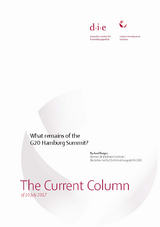The Current Column
What remains of the G20 Hamburg Summit?
Berger, AxelThe Current Column (2017)
Bonn: German Development Institute / Deutsches Institut für Entwicklungspolitik (DIE) (Die aktuelle Kolumne vom 10.07.2017)
At first glance, the communiqué of the G20’s Hamburg Summit is an ordinary piece of international diplomacy. However, as is often the case, context is key to assess its real importance. Two context factors defined this year’s negotiations of G20 leaders in the exhibition halls in the city center of Hamburg. Within the negotiation room, an unruly US president questioned a number of common positions that had already been adopted by the G20 in previous years. Given this exceptional challenge, the communiqué entails a number of encouraging commitments that did not at all seem possible just a couple of days ago. Outside of the cosy negotiation room, however, violent and peaceful protesters on the streets of Hamburg sent a defiant message to the leaders of the G20. From their perspective, the G20 appears neither effective nor legitimate. Taming Trump Let’s start with the positive. Chancellor Merkel avoided the worst possible outcome – a Gzero constellation in which the leaders of the economically most important countries could not agree on critically important issues. On climate, of course, only the G19 agreed on reaffirming the Paris Agreement while it only took note of the withdrawal of the US from the agreement. However, in light of the provocative stance of the current US administration – documented by the insistence on the inclusion of a sentence on the promotion of ‘clean fossil fuels’ – it is a major achievement to preserve the cohesion of a group of countries that include the likes of Russia or Saudi Arabia. Crucially, the world is not waiting for the US on its joint path towards a more climate-friendly global economy. Given the recent spat on trade between the US and a number of G20 countries including the German chair the respective section in the communiqué is surprisingly strong. It stresses the importance of the non-discrimination principle and emphasises the importance of a rules-based international trading system including effective rules’ enforcement within the World Trade Organization. The G20, furthermore, commits to promote social and environmental standards and human rights in global value chains. Reading between the lines, though, some differences are still visible. For example, the G20 in Hamburg commits to “fight protectionism including all unfair trade practices” while recognising “legitimate trade defence instruments”. A year earlier in the Chinese city of Hangzhou the G20 condemned protectionism in all its forms. While a diplomatic gridlock on trade was avoided, it remains to be seen if this compromise is sufficient to curb and scale back the widespread recourse of G20 countries to trade-restricting measures. Beyond these two controversial issues that dominated the headlines prior to the summit, the meeting in Hamburg got a number of new initiatives off the ground such as the launch of a G20 Africa Partnership, the commitment to combat antimicrobial resistance or the adoption of an action plan to reduce marine litter. The G20 also gained further ground on some of the existing commitments such as financial regulation, the implementation of the 2030 Agenda for Sustainable Development or the digital economy. Who cares? While avoiding a backsliding on many of the G20’s commitments is a diplomatic success, it is, however, not enough to get the G20 out of its deep-routed legitimacy crisis. The pictures of peaceful protests but also of the violent riots and burning cars in the streets of Hamburg are so much more powerful than a 15-page communiqué, no matter how well-crafted it could ever be. Certainly, it was a big gamble of the German host to hold the G20 summit in the middle of a city known for its (violent) protest culture. But, circumventing violent protests by moving the summit to a remote beach resort, like in 2015, or by clearing whole city districts, like in 2016, is also not the way forward. Of course, in particular the heavy clashes between radical protestors and the police that made the international headlines. However, we should not forget the tens of thousands protestors peacefully demanding substantial change to the current model of globalization. They are the ones that really deserve closer attention of the G20 leaders. Participation and accountability So, what are lessons from Hamburg for Argentina and Japan that will host the G20 in 2018 and 2019 respectively? Agreeing on better policies that address the economic, social and environmental challenges of our times is necessary but not sufficient. A first crucial lesson for the G20, therefore, must be to find new ways to involve those that feel affected by the decisions that the G20 adopts or fails to adopt. The German presidency made some progress with regard to establishing dialogues with the so called engagement groups representing business associations, non-governmental organisations, labour unions or thinks tanks. However, if we like it or not, often these groups are perceived by many as being part of an elite that is not responsive to the needs and challenges of broad parts of our societies. Not only the G20 but also the engagement groups must find new ways to communicate with the men and women on the street and to give them a real chance to express their concerns and needs and to feed them back into the G20 process. At the same time, the G20 must improve its framework to report on its successes and shortcomings and allow more transparency. Some of the works streams of the G20 have such accountability mechanisms in place. These mechanisms should be broadened to establish an overarching accountability framework for the whole G20 that also involves stakeholders outside of the official process. What remains from Hamburg is the hope that this meeting will not only lead to more international cooperation despite – or maybe because of – the isolationist strategy of the Trump administration, but also to increased efforts to make the G20 a more transparent, participatory and accountable process.


